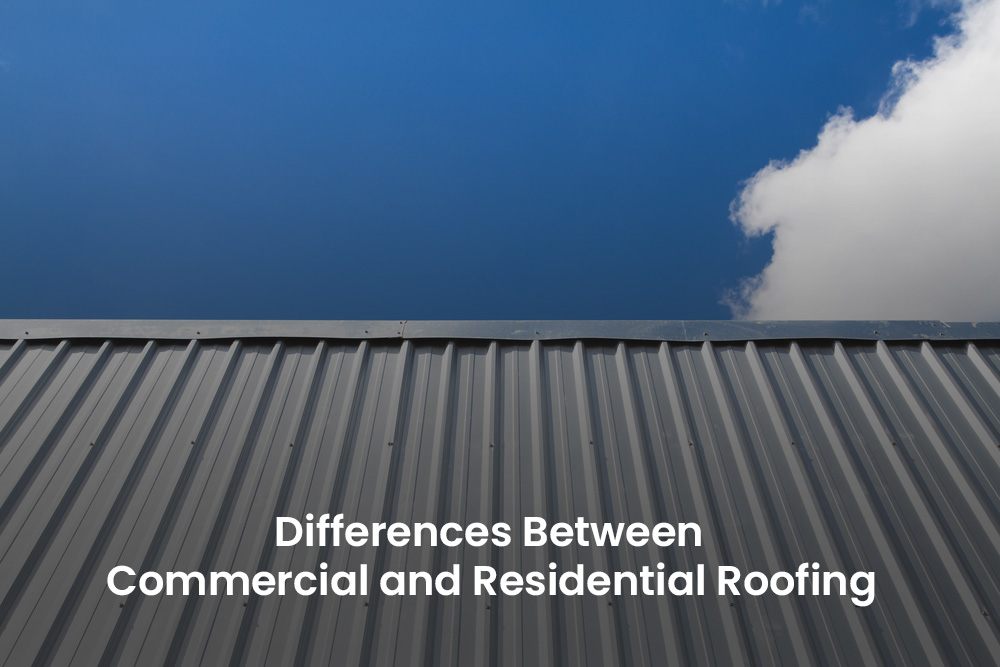Differences Between Commercial and Residential Roofing

Whether a home or a place of business, a roof is an essential component; however, not every top is the same. They are not interchangeable because of their dissimilar construction, features, and upkeep. Keeping these distinctions in mind can aid your decision-making when it comes time to repair or replace your roof. In this article, we'll compare and contrast commercial and residential roofing to help you decide which is best for your building. Get yourself a cup of coffee, and settle down for an exciting exploration of the roofing industry.
Commercial Roofing Vs Residential Roofing
Roofing Design
The roof's layout is the primary defining characteristic between commercial and residential roofing. The main objective of roofing design is to make sure the roof can endure weather elements, including wind, rain, snow, and hail.
Heating, ventilation, and air conditioning (HVAC) systems necessitate flat or low-slope roof layouts; therefore, this is the norm for commercial buildings. On the other hand, residential roofs have steeper slopes to avoid water pooling and for aesthetic purposes.
Another difference in roofing design between commercial and residential buildings lies in their structural components. Commercial roofs often require additional support structures due to their large size, which may include steel trusses or concrete beams. In terms of aesthetics, residential roofs offer more flexibility in design options compared to commercial ones.
Roofing Materials
When it comes to residential roofs, though, you'll have many more material possibilities to choose from. Commercial buildings typically have flatter roofs, such as those made of metal or nearly flat membranes, while residential roofs have steeper slopes. Single-ply membranes and metal sheets are frequently used for commercial roofing.
The roof of a business building must be able to withstand high temperatures without being damaged if, for instance, it contains a lot of machinery that releases a lot of heat. Residential roofs, on the other hand, are custom-made to meet the aesthetic, durability, and maintenance needs of individual homeowners.
Several considerations, including climate, budget, and building construction, should be considered while deciding on the best roofing material. Talking to a professional roofer is essential because they can provide you with advice tailored to your exact situation.
Roof Installation
There are significant distinctions between roofing projects for commercial buildings and those for private residences. A commercial project's size considerations are more likely to be at the forefront than those of a residential project for a number of reasons. There might be a need for more significant forethought and cooperation to guarantee the project goes off without a hitch.
The nature of the roofing materials is another crucial aspect to think about. Metal sheets, such as aluminum, may be used on residential roofs, but commercial roofs often require more specialized materials, such as metal sheets or flat roofing systems.
It's not just the materials and design that might vary significantly between commercial and residential properties; the installation procedure itself can be pretty different as well. The scale of effort involved in commercial projects typically necessitates more time and additional resources.
Maintenance
The fourth distinction has to do with the maintenance of commercial and residential roofs. Once every few months is all that is required for a visual inspection by the homeowner. During this ground-level examination, we look for signs of storm or other event damage. Checking for things like broken down gutters and other signs of wear.
It is customary practice to have a professional roofing contractor assess and maintain a commercial roof. The contractor is responsible for inspecting for problems like leaks. Professional reviews of flat roofs on commercial buildings happen more frequently. An inspector should be involved on a regular basis. After contractors working on mechanical equipment have finished their job on the roof, the inspector must evaluate the surface to make sure no harm has been done.
Roofing work should only be done by a professional who has received extensive training and has extensive experience working on roofs safely. If you keep up with routine repairs, the roof of your commercial or residential building will serve you well for many years.
Conclusion
At the end of the day, whether you are dealing with a commercial or residential roofing project, there is no denying that they require different approaches. From design to materials and installation methods, one must be knowledgeable about these differences to get optimal results.
It's important to note that when it comes to roofing projects, one size does not fit all. The differences between commercial and residential roofing go beyond just size; they involve various factors such as materials used, structural designs, and budget constraints, among others. Acknowledging these fundamental disparities upfront and working with experienced professionals who specialize in each area will ensure that your building's roof meets its unique needs while delivering long-lasting protection against weather elements.
If you're in the market for a new roof, give Oralium roofing some thought. Oralium offers dependable weather protection for homes and businesses, with solutions that are both long-lasting and aesthetically pleasing. Their roofing products are highly insulative and built to resist a wide range of climates. Put your faith in the durability and reliability of Oralium roofing to improve the look of your home and guarantee years of reliable service. The potential and advantages of Oralium roofing for your needs may be discussed in detail with our experts.
Feel free to contact us for your enquiries.